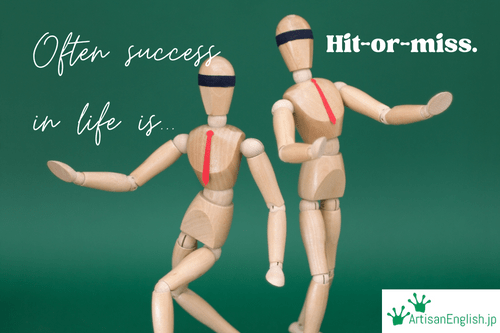
YouTube / iTunes / Spotify / Radio Public / Pocket Casts / Google Podcasts / Breaker / Overcast
Listen to ArtisanEnglish.jp posts & lesson intros here.
WotD: Hit-or-miss
Growing up as a small child, like all little boys, I thought my father was Superman.
He was big and strong and had all the answers to all the problems.
Then I realized that much of what he did was hit-or-miss.
The adjective hit-or-miss describes a situation or action that is as likely to be unsuccessful as it is to be successful.
I remember quite vividly the moment my father became a man in my eyes instead of a Superman.
I was freshly arrived back on the island after being overseas for ten years.
Of course, when I left, I had no plan at all.
I was an angry and confused young man with a few thousand dollars in my pocket and a bus ticket.
The entire thing was hit-or-miss.
I was as likely to begin a new life somewhere as I was to end up dead in a ditch on the side of a road in a strange town.
I was sitting down having a beer in the bar with my father and his friend while watching an ice hockey game at Memorial Stadium in St. John’s, Newfoundland, when my father looked at me and said, “I could never have done what you did.”
He told me that I had been on the go for ten years, travelling halfway around the world in places he’s never heard of, and he couldn’t even spell half of them.
I tried to explain to him I had no idea what I was doing.
Most of the decisions I made were hit-or-miss, and I was lucky most of them were hits.
He looked at me and said, “Yes, but you had the guts to do it.”
Flesch-Kincaid Readability Test
This post is understandable by someone with at least a 6th-grade education (age 11).
On the Flesch-Kincaid reading-ease test, this post scores 80.
The easier a passage is to read, the higher the score on a scale of 0 – 100.

